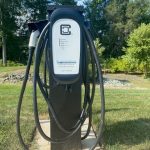Transportation
Commuter travel accounted for 17% of Elon’s FY 2023 carbon emissions, and the University Fleet accounted for another 2%.
With a goal of climate neutrality by 2037, Elon uses, encourages and supports transportation that reduces carbon emissions.
Visit the Transportation web site for information on the below transportation programs and much more!
- Elon Express
- Link Transit
- Share the Ride NC (find a carpool partner!)
- Bike rental program
- Airport shuttles
Emergency Ride Home Program
The Emergency Ride Home Program reimburses eligible faculty/staff commuters for a qualified emergency ride home from work a maximum of four times in a fiscal year.
To be eligible for Elon’s Emergency Ride Home Program, participants must:
- Be a part-time or full-time employee and
- Have carpooled, biked, walked, taken the train or a bus to work on the day a ride is needed
The Emergency Ride Home Program is available for faculty/staff commuters when:
- They or an immediate family member gets sick or has a crisis,
- Their carpool driver has to unexpectedly leave early or stay late, or
- They must work unscheduled overtime
Stopping on the ride home for an emergency-related task, such as picking up a sick child or medication, is allowed. To be reimbursed for an emergency ride home, a completed reimbursement form must be submitted to the Office of Sustainability via email (sustainability@elon.edu) within 14 days of the date the emergency ride home is taken. A receipt for the emergency ride home must be submitted along with the reimbursement form. Participants may be asked to provide feedback to help assess the program.
Submit Emergency Ride Home reimbursement form

University Fleet
Elon has over 60 alternative fueled vehicles. This includes biodiesel, electric utility and security and hybrid vehicles. Electric vehicles have no tailpipe emissions. They run off of batteries, which are charged when they are not being used. A few of the electric utility vehicles have been equipped with a solar panel to extend their charge time during the day. Hybrid vehicles emit less pollution and get better gas mileage than non-hybrid versions of the same vehicle type.
 Low-Emitting Vehicle (LEV) Parking
Low-Emitting Vehicle (LEV) Parking
To encourage the use of low-emitting vehicles, there are several parking lots on campus that have preferred parking spaces designated for LEVs. An LEV permit is required to park in these spaces and can be obtained from the Traffic Office.
Do you drive a LEV? LEVs include non-hybrids as well as hybrid models. LEVs have achieved a minimum green score of 40 on the American Council for an Energy Efficient Economy (ACEEE) annual vehicle rating guide. See if your car is on the LEV list (use the LEED v. 2009 40+ tab). To learn more about LEVs and to find out if you drive one visit www.greenercars.org.
Electric Vehicle Charging
There are 18 electric vehicle (EV) charging spaces on campus. There are Level 2 charging spaces in the following parking lots: McMichael Science Center (7), Oaks (2), Colonnades (4), Gerald Francis Center (2), Historic Neighborhood East (2). In addition, a Tesla Connector/Charging Station is located in the Inman Admissions Welcome Center parking lot for visitors. Elon does not charge to use the charging stations.
 Bicycle Repair Station
Bicycle Repair Station
A self-service bike repair station is located just outside the Campus Recreation entrance of the Koury Athletic Center. The station provides basic tools for bike maintenance including an air pump. The QR code on the station is linked to this site with short video tutorials about some basic repairs.